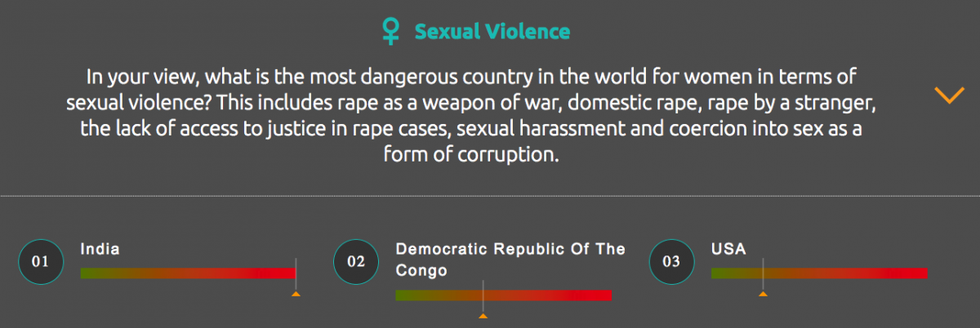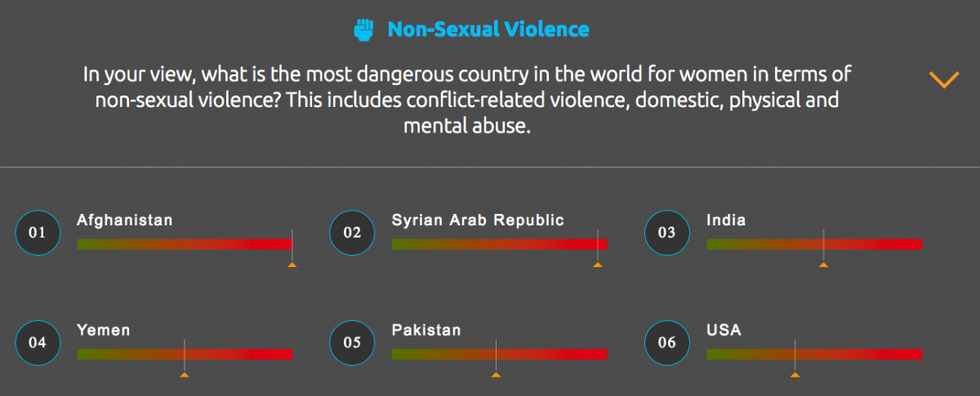
Activists rally during a protest against Republican presidential candidate Donald Trump for his treatment of women in front of Trump Tower on October 17, 2016 in New York City. (Photo: Drew Angerer/Getty Images)
To donate by check, phone, or other method, see our More Ways to Give page.

Activists rally during a protest against Republican presidential candidate Donald Trump for his treatment of women in front of Trump Tower on October 17, 2016 in New York City. (Photo: Drew Angerer/Getty Images)
As the #MeToo movement continues to expose the sexually abusive, exploitative, and violent behavior of men in positions of political and corporate power in America, a new report published by the Thomson Reuters Foundation on Tuesday found that the United States is among the 10 most dangerous countries in the world for women, in large part due to its high levels of sexual violence.
Based on a survey of nearly 550 experts on women's issues from a variety of professions--including health workers, academics, development professionals, and journalists--the report found that the U.S. is the 10th most dangerous nation for women on the planet, behind Saudi Arabia, Afghanistan, Somalia, and several other nations.
\u201cUnsurprising in a country that elected an alleged sexual abuser to its highest office. https://t.co/z5Cqm5KOW7\u201d— NARAL (@NARAL) 1530051541
"The United States ranked as the 10th most dangerous country for women, the only Western nation to appear in the top 10," according to the report, which is based on surveys conducted after the #MeToo movement began to grow rapidly last October.
When experts were asked "which was the most dangerous country for women in terms of sexual violence including rape, sexual harassment, coercion into sex, and the lack of access to justice in rape cases," the U.S. was ranked third.

The U.S. was also ranked sixth in non-sexual violence, which includes domestic and psychological abuse:

"We try to sell that we are a country of freedom and also of safety, but there are a lot of people in our country that are not safe, and victims of sex assault and domestic violence are certainly in that group," Abby Honold, a sexual assault survivor and activist in Minneapolis, concluded in an interview with the Thomson Reuters Foundation.
Donald Trump’s attacks on democracy, justice, and a free press are escalating — putting everything we stand for at risk. We believe a better world is possible, but we can’t get there without your support. Common Dreams stands apart. We answer only to you — our readers, activists, and changemakers — not to billionaires or corporations. Our independence allows us to cover the vital stories that others won’t, spotlighting movements for peace, equality, and human rights. Right now, our work faces unprecedented challenges. Misinformation is spreading, journalists are under attack, and financial pressures are mounting. As a reader-supported, nonprofit newsroom, your support is crucial to keep this journalism alive. Whatever you can give — $10, $25, or $100 — helps us stay strong and responsive when the world needs us most. Together, we’ll continue to build the independent, courageous journalism our movement relies on. Thank you for being part of this community. |
As the #MeToo movement continues to expose the sexually abusive, exploitative, and violent behavior of men in positions of political and corporate power in America, a new report published by the Thomson Reuters Foundation on Tuesday found that the United States is among the 10 most dangerous countries in the world for women, in large part due to its high levels of sexual violence.
Based on a survey of nearly 550 experts on women's issues from a variety of professions--including health workers, academics, development professionals, and journalists--the report found that the U.S. is the 10th most dangerous nation for women on the planet, behind Saudi Arabia, Afghanistan, Somalia, and several other nations.
\u201cUnsurprising in a country that elected an alleged sexual abuser to its highest office. https://t.co/z5Cqm5KOW7\u201d— NARAL (@NARAL) 1530051541
"The United States ranked as the 10th most dangerous country for women, the only Western nation to appear in the top 10," according to the report, which is based on surveys conducted after the #MeToo movement began to grow rapidly last October.
When experts were asked "which was the most dangerous country for women in terms of sexual violence including rape, sexual harassment, coercion into sex, and the lack of access to justice in rape cases," the U.S. was ranked third.

The U.S. was also ranked sixth in non-sexual violence, which includes domestic and psychological abuse:

"We try to sell that we are a country of freedom and also of safety, but there are a lot of people in our country that are not safe, and victims of sex assault and domestic violence are certainly in that group," Abby Honold, a sexual assault survivor and activist in Minneapolis, concluded in an interview with the Thomson Reuters Foundation.
As the #MeToo movement continues to expose the sexually abusive, exploitative, and violent behavior of men in positions of political and corporate power in America, a new report published by the Thomson Reuters Foundation on Tuesday found that the United States is among the 10 most dangerous countries in the world for women, in large part due to its high levels of sexual violence.
Based on a survey of nearly 550 experts on women's issues from a variety of professions--including health workers, academics, development professionals, and journalists--the report found that the U.S. is the 10th most dangerous nation for women on the planet, behind Saudi Arabia, Afghanistan, Somalia, and several other nations.
\u201cUnsurprising in a country that elected an alleged sexual abuser to its highest office. https://t.co/z5Cqm5KOW7\u201d— NARAL (@NARAL) 1530051541
"The United States ranked as the 10th most dangerous country for women, the only Western nation to appear in the top 10," according to the report, which is based on surveys conducted after the #MeToo movement began to grow rapidly last October.
When experts were asked "which was the most dangerous country for women in terms of sexual violence including rape, sexual harassment, coercion into sex, and the lack of access to justice in rape cases," the U.S. was ranked third.

The U.S. was also ranked sixth in non-sexual violence, which includes domestic and psychological abuse:

"We try to sell that we are a country of freedom and also of safety, but there are a lot of people in our country that are not safe, and victims of sex assault and domestic violence are certainly in that group," Abby Honold, a sexual assault survivor and activist in Minneapolis, concluded in an interview with the Thomson Reuters Foundation.